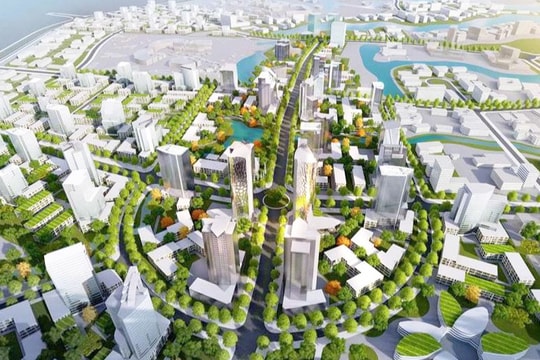Hello, Vietnam!
23:10 - 02/05/2017
Sally Cole Johnson on August 10, 2007 - Is Vietnam the next logical migration for the semiconductor industry—particularly for semiconductor assembly and test? While the microelectronics industry hasn't been active in Vietnam up until this point, both Intel and V-CAPS are currently working on building assembly and test facilities there.
Why Vietnam? As Harry Rozakis, CEO of Vietnam–Chipscale Advanced Packaging Services (V-CAPS), is quick to point out, "It's not China and it's not India, which have too much bureaucracy. Vietnam doesn't. It mirrors to a much greater extent the southeast Asia that we who've been in the business a long time remember: Malaysia and Singapore 20 years ago. China is getting overcrowded, labor rates are skyrocketing, and it's still extremely difficult to deal with issues related to their antiquated import/export laws. Our location in Vietnam is only 128 miles away from China's border, so we think there are some real opportunies in the future and Vietnam is the place to be."
While Rozakis vacationed in Vietnam about four years ago, he realized that it was "a future Asian tiger ready to emerge." Two years later, when he left his position as CEO of ASAT Holdings Ltd., Rozakis began thinking about setting up a factory based on "commodity" chip-scale packages. In November of 2005, he assembled a team of semiconductor professionals he'd worked with in the past and they started moving forward with the project. They put together a business plan, executive summary, and worked out a timeline of what it would take to get the project going. Rozakis describes V-CAPS' business plan as one that goes beyond "thinking outside the box" to deliver a whole "new box" that will offer IDMs and fabless semiconductor manufacturers a new alternative.
As it turns out, Rozakis and his V-CAPS colleagues didn't know Intel was going to Vietnam when they started making their plans. But it turned out to be a good thing. "When Intel made their announcement in early 2006 about plans to build an assembly and test facility in Vietnam, it basically validated all of the due diligence we'd done on the country," says Rozakis. "We didn't know if we'd be first or not, but we knew there was no microelectronics industry there. We were very pleased to hear Intel's announcement, because in no way do we compete with them—they could even be a prospective customer, although we didn't go to Vietnam with that expectation."
The Vietnamese government has developed two sites for the high-tech industry: One in the north, one in the south. In an unexpected twist, after much debating, Intel decided to go with the site in Ho Chi Mihn City, in the south. "The good thing for us was that the land in the north at the Hoa Lac High-Tech Park, which is 20 km outside of Hanoi, had been prepared for Intel, and then they decided to go south. As a result, we were able to pick up the Intel lot. So we've signed our MOU to secure 20 hectares of land," explains Rozakis. "We're very pleased and it's a great location. The Vietnamese government is working very hard to build the infrastructure to support us."
What's it like working with the Vietnamese government? "Vietnam has proved to be significantly easier than China thus far," Rozakis says. "One of the main reasons is access to government officials. Another fantastic thing about Vietnam is that it tends to be more like the Philippines in terms of the english language skills of the people, which of course makes it easier as well. That, and the overall desire to work, and their friendly attitude toward Americans. One would never believe we were at war in Vietnam 30-35 years ago. Today, the attitude toward Americans is very positive. And Vietnam is anxious to become a first-world nation."
And the fact that Vietnam is a communist country hasn't been an issue so far for either V-CAPS or Intel, according to Rozakis. "We talk to Intel on a regular basis to compare notes," he says. "Where Vietnam is lacking is that they're in the process of updating many laws that are applicable to foreign investment in the country and are working to fine-tune their incentive programs for foreign investors. By joining the WTO, and with their bilateral trade agreement with the U.S, they basically have to clean up the economic/political infrastructure within the country that's designed to support foreign direct investment in Vietnam. In that respect, many laws are changing on an ongoing basis. One key thing new investors going into Vietnam need to do is get a good local attorney who's capable of staying up to speed on the changes in the laws. The positive side about the changes in the laws is that thus far none of them are punitive as far as it relates to foreign investment. If anything, it's geared toward structuring better incentives for foreign investors."
One of V-CAPS' goals is to work closely with the university structure in Vietnam to eventually come up with some new alternatives for wafer-level packaging (WLP), which is where V-CAPS plans to focus its initial development. "Because the Vietnamese government is very pro R&D right now, the fact that we're going to do WLP research in their country makes them very happy," Rozakis says. "And they have a superb university system in Vietnam."
Then there's the issue of cost. "It's a substantially lower cost than China, from a direct labor standpoint," Rozakis explains. "It's about 1/3 the cost of China. Right now in Vietnam, the minimum wage is about $45/mo. I expect we'll pay our employees somewhere around $100/mo. And since the Vietnamese like to go home every night, we don't have a requirement to build dormatories like in China. So there's a significant cost savings there, particularly as it relates to overhead. Even the overall cost of food, and anything else you name, is cheaper in Vietnam right now. We expect that our point of entry into the marketplace will enable us to be the low-cost leader, initially."
V-CAPS will break ground on their 30,000-sq.-m manufacturing facility, as well as office building, and training center in December '07, with the goal of having the buildings completed within 12 months. With more than 20 hectares, they have enough land to build three factories, if things go well the first few years.
Các bài viết khác



